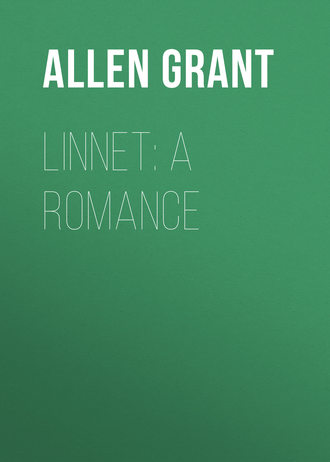 полная версия
полная версияLinnet: A Romance
“Is Linnet such a songstress then?” Florian cried, with that dubious smile of his.
The wirth looked grave. “She can sing,” he said, pointedly. His dignity was hurt by the young man’s half-sceptical, half-bantering tone. And your Tyroler is above all things conservative of his dignity.
These repeated commendations of this unknown Linnet, however, with her quaintly pretty un-German-sounding name, piqued the two Englishmen’s curiosity in no small degree as to her personality and powers, so that when the wirth next morning announced after breakfast, with a self-satisfied smile, “Linnet’s coming down to-day,” Florian and Will looked across at each other with one accord, and exclaimed in unison, “Ah, now then, we shall see her!”
And, sure enough, about five o’clock that afternoon, as the strangers were returning from a long stroll on the wooded heights that overhang the village, they came unexpectedly, at a turn of the mountain footpath, where two roads ran together, upon a quaint and picturesque Arcadian procession. A long string of patient cows, in the cream-coloured coats of all Tyrolese cattle, wound their way with cautious steps down the cobble-paved zig-zags. A tinkling bell hung by a leather belt from the neck of each; garlands of wild flowers festooned their horns; a group of peasant children assisted at the rude pageant. In front walked a boy, with a wreath slung across his right shoulder like a sash, leading the foremost cow most unceremoniously by the horns; the rear was brought up by a pretty sunburnt girl, with a bunch of soft pasque-flowers stuck daintily in her brown hair, and a nosegay of bluebells peeping coquettishly out of her full round bosom. Though vigorous-looking in figure, and bronzed in face by the sun and the open air, she was of finer mould and more delicate fibre, Will saw at a glance, than most of the common peasant women in that workaday valley. Her features were full but regular; her mouth, though large and very rich in the lips (as is often the case with singers), was yet rosy and attractive; her eyes were full of fire, after the true Tyrolese fashion; her rounded throat, just then trembling with song, had a waxy softness of outline in its curves and quivers that betrayed in a moment a deep musical nature. For she was singing as she went, to the jingling accompaniment of some thirty cow-bells; and not even the sweet distraction of that rustic discord could hide from Will Deverill’s quick, appreciative ear the fact that he stood here face to face with a vocalist of rare natural gifts, and some homespun training.
He paused, behind the wall, as the procession wound round a long double bend, and listened, all ears, to a verse or two of her simple but exquisite music.
“This must be Linnet!” he cried at last, turning abruptly to Florian.
And the boy at the head of the procession, now opposite him by the bend, catching at the general drift of the words with real Tyrolese quickness, called out with a loud laugh to the singer just above: “Sagt er, das musz ja Linnet seyn!” and then exploded with merriment at the bare idea that the Herrschaft should have heard the name and fame of his companion.
As for the girl herself, surprised and taken aback at this sudden interruption, she stood still and hesitated. For a moment she paused, leaning hard on the long stick with which she guided and admonished her vagrant cows; then she looked up and drew a long breath, looked down and blushed, looked up once more and smiled, looked down and blushed again. They had overtaken her unawares where the paths ran together; but as each was enclosed with a high wall of granite boulders, overgrown with brambles, she had no chance of perceiving them till they were close upon her. She broke off her song at once, and stood crimson-faced beside them.
“Ah, sing again!” Florian cried, folding two dainty palms in a rapture on his breast, and putting his delicate head on one side in a transport of enchantment “Why, Deverill, how she sings! what a linnet, indeed! and how pretty she is, too! For the first time in my life, I really regret I can’t speak German!”
The singer, looking up, all tremulous to have overheard this unfeigned homage, made answer, to Florian’s equal delight and surprise, “I can speak a little English.”
It would be more correct, perhaps, to put it that what she actually said, was: “Ei kann schpiek a liddle Ennglisch”; but Florian, in his joy that any means of inter-communication existed between them at all, paid small heed at the time to these slight Teutonic defects in her delivery of our language.
“You can speak English!” he exclaimed, overjoyed, for it would have been a real calamity to him to find a pretty girl in the place, with a beautiful voice, and he unable to converse in any known tongue with her. “How delightful! How charming! How quite too unexpected! I’m so glad to know that! For had it been otherwise, I should really have had to learn German to talk with you!”
This overstrained compliment, though it rose quite naturally to Florian’s practised lips, and was far more genuine than a great deal of his talk, made the girl blush and stammer with extreme embarrassment. She was unaccustomed, indeed, to such lavish praise, above all from the gentlefolk. Was the gnädige Herr making fun of her, she wondered? She grew hot and uncomfortable. Fortunately for her self-possession, however, Will Deverill intervened with a more practical remark. “You speak English, do you?” he repeated. “That’s odd, in these parts. One would hardly have thought that! How did you come to learn it?”
“My father was a guide,” the girl answered, slowly, making a pause at each word, and picking her way with difficulty through the insidious pit-falls of British pronunciation. (She called it fahder.) “He taked plenty Ennglish gentlemen up the mountains before time. I learn so well from him, as also from many of the Ennglish gentlemen. Then, too, I take lesson from Herr Hausberger in winters, and from Ennglish young lady at the farm by Martinsbrunn.”
Florian gazed at his companion with an agonised look of mingled alarm and horror. “Do you know who she means?” he cried, seizing Will’s arm. “This is too, too terrible! The girl on the hillside who sticks out her tongue! that horrible little Cockney! She’ll teach this innocent child to say ‘naow,' and ‘lidy'! At last I feel I have a mission in life. We must save her from this fate! We must instruct her ourselves in pure educated English!”
“And how do you come to be called Linnet?” Will inquired with some interest, a new light breaking in upon him. “That’s surely an English name. Who was it first called you so?”
“An Ennglish gentleman when I was all quite small,” the girl replied, with much difficulty, searching her phrases with studious care. “He stop at my father’s hut on our alp many nights – I know not how man says it – so must he go up the mountains. I sing to him often when he come down at evening. My right name is called in German, Lina; but the gentleman, says he, that I sing like a bird. A linnet, that is in Ennglish a singing-bird. Therefore, Linnet he call me. The name please my father much, who make a great deal of me; so from that time in forwards, all folk in the village call me also Linnet.”
Will broke out into German. “They’re quite right,” he said, politely, though with less ecstasy than Florian; “for you do indeed sing like a real song-bird. I’m so sorry we interrupted you; pray go on with your song again.”
But Linnet hung her head. “No, no,” she answered, hastily, in her own native tongue, glad to find he spoke German. “I didn’t know I was overheard. If I’d been singing for such as you, I’d not have chosen a little country song like that. And besides” – she broke off suddenly, with a coy wave of her brown hand, “I can’t sing before strangers the same as I can before my own people.” And she tapped the hindmost heifer with her rod as she spoke, to set the line in motion; for the cows, after their kind, had taken advantage of the pause to put down their heads to the ground, and browse placidly at the green weeds that bordered the wayside.
At one touch of her wand the bells tinkled once more; the long string got under way; the children by the side recommenced their loud shouts of rustic merry-making. For the return of the cows from the alp is a little festival in the villages; it ends the long summer’s work on the mountain side, and brings back the unmarried girls from their upland exile to their homes in the valley. Linnet drove her herd now, however, more soberly and staidly. The free merriment of Arcadia had faded out of the ceremony. One touch of civilisation had dispelled the dream. She knew she was observed; she knew the two strangers were waiting to hear if she would trill forth her wild song again, for they followed close at her heels, talking rapidly among themselves in their own language – so rapidly, indeed, that Linnet could hardly snatch here and there by the way a single word of their earnest conversation. Once or twice she looked back at them, half-timidly, half-provokingly.
“Sing again!” Florian cried, clasping his hands in entreaty.
But the wayward alp-girl only laughed her coy refusal.
“No, no,” she said in her patois, with a little shake of her beautiful head; “that must not be so. I sing no more now. I must drive home my cows. They are tired from the mountains.”
“But, I say,” Florian cried at last, bursting in upon his mountain nymph with this very colloquial and unpoetic adjuration; “look here, you know, Fräulein Linnet, you say you learn English from our landlord, Herr Hausberger. Now, what does he want to teach you for?”
Linnet turned round to him with a naïve air of unaffected surprise. “Why, when he teach me Ennglish songs,” she said, “I will know what mean the words. Also, I have remembered a little – a very little – since the Ennglish gentleman teach me at my father’s. Besides, too, shall I not need it when I go to Enngland?”
“Go to England!” Florian repeated, all amazed at the frank remark. She seemed to take it for granted they must know all her plans. “When you go to England! Oh, he means to take you there, then! You’re one of his troupe, I suppose; or you’re going to be one.”
“I am not gone away yet,” Linnet answered, not a little abashed to find herself the centre of so much unwonted interest; “but I go next time; I will sing with his band. All summers, I stop on the mountain and milk; with the winter, come I down to the house to practise.”
“But you don’t mean to say,” Will put in, in German (it was easier so for Linnet to answer him), “he lets a singer like you live out by herself in a châlet on the hills with the cows all summer?”
Linnet held up her hands, palm outward, with a pretty little gesture of polite deprecation. Her movements were always naturally graceful. “Why not?” she said, brightly, in German, with no little suppressed merriment at his astonished face. “That’s Andreas Hausberger’s plan; he believes in that way; he calls it his system. He says we Zillerthalers owe our beautiful voices – for they tell us we can sing a great deal better than the people in any other valley about – to our open-air life on the very high mountains. The air there is thin, and it suits our throats, he says.” She clasped her hand to her own as she spoke, that beautiful, well-developed, clear-toned organ, with a natural gesture of unconscious reverence. “It develops them – that’s his word; he believes there’s nothing like it. Entwickelung; entwickelung! I get more good, he thinks, for my voice in the summer on the alp than I get from all my lessons in the winter in the valley. For the throat itself comes first – that’s what Andreas holds – and afterwards the teaching. Not for worlds would he let me miss my summer life on the mountains.”
“And how long has he been training you?” Will inquired with real interest. This was so strange a page of life thus laid open before him.
“Oh, for years and years, gnädige Herr,” Linnet answered, shyly, for so much open attention on the young man’s part made her awkwardly self-conscious. “Ever since my father died, he has always been teaching me.”
“Has your father been dead long?” Will inquired.
Linnet crossed herself devoutly. “He was killed eight years ago on the 20th of August last,” she said, looking up as she spoke towards the forest-clad mountains. “May Our Dear Lady and all holy saints deliver his honoured soul from the fires of purgatory!”
“But your mother’s alive still, I suppose, Fräulein,” Florian put in with a killing smile; he had been straining his ears, and was delighted to have caught the general drift of the conversation.
“Yes; thanks to the Blessed Virgin, my mother live still,” Linnet answered in English. “And I keep her comfortable, as for a widow woman, from that which Andreas Hausberger pay me for the summer, as also for the singing. But for what, mein Herr, do you make to call me Fräulein? Do you wish to mock at me? I am only an alp-girl, and I am call just Linnet.”
She flushed as she spoke, and turned hastily to Will. “Tell him,” she said in German, with an impatient little toss of one hand towards Florian, “that it isn’t pretty of him to make fun of poor peasant girls like that. Why does he call me such names? He knows very well I am no real Fräulein.”
Florian raised his hat at once in his dimpled small hand, with that courtly bow and smile so much admired in Bond Street. “Pardon me,” he said, with more truth and feeling than was usual with him; “you have a superb voice; with a gift like that, you are a Fräulein indeed. It extorts our homage. Heaven only knows to what height it may some day lead you.”
CHAPTER V
THE WIRTH’S THEORY
In the evening, while they dined, the landlord came in to see how they fared, and wish them good appetite: ’tis the custom with distinguished guests in the Tyrol. The moment he entered, Florian, all agog, attacked him at once on the subject of their wonderful find that afternoon on the hillside. “Well, Herr Hausberger,” he cried in his high-flown way, “we’ve seen and heard your Linnet – heard her warbling her native wood-notes wild, to the tune of her own cow-bells on her lonely mountains. Now, what do you mean, sir, by turning out a divine singer like that – I’m a musical critic myself, and I know what I’m talking about – what do you mean by turning her out to make butter and cheese in a solitary hut on an Alpine pasture? It’s sheer desecration, I tell you – sheer wicked desecration; there’s nothing, almost, that girl couldn’t do with her voice. She’s a genius – a prodigy; she ought to be clothed in purple and fine linen, and fare sumptuously every day on champagne and turtle. And you, sir – you send her up to herd cows all alone, in an inclement clime, on a barren hill-top!”
Andreas Hausberger gazed at him with a self-contained smile that was extremely characteristic. He bowed a sarcastic bow which Florian misinterpreted for polite subservience. “Are you running this show or am I?” he asked, after a fresh pause, with a quaint reminiscence of his Western experience.
“You are, undoubtedly,” Florian answered, taken aback at this unexpected assault. “But you ought to run it, all the same, on rational and humane and intelligent principles. You owe this girl’s voice, as a delight and a treasure, to US, the enlightened and critical connoisseurs of two eager continents. Nature produced it that we might enjoy it. It was intended to give us some of those exquisite moments of artistic pleasure which are the sole excuse creative caprice can plead for the manifold defects of the Universe.”
Andreas Hausberger looked down at him with a half-pitying curl on those stern thin lips of his. Florian had attacked him lightly where his position was strongest. “That’s all right,” he said, slowly, with a chilly drawl – ’twas his favourite expression. “And do you think then,” he went on, bursting forth almost scornfully, in spite of his outward deference, “we Zillerthalers get our fine singing voices and our musical ears by pure chance and accident? Not so, you may be sure of it. It’s no mere coincidence that our men and women can almost without exception sing like birds from their childhood upwards by the light of Nature. What gives them this power? Why, they live their lives long, in summer especially, in the thin clear atmosphere of our higher mountains. There isn’t much sour-stuff in it – what do you call it in English? – oh, oxygen, don’t you? Wal, there isn’t much oxygen in that thin upper air – rarefied, I think you say – and therefore they’re obliged to fill their lungs well and expand their chests” – he swelled himself out as he spoke, and showed off his own splendid girth to the fullest advantage – “and that gives them large reservoirs and rich, pure-toned voices.”
“I never thought of that before,” Will Deverill interposed, much struck by the landlord’s plausible reasoning. “I suppose that’s why mountain races, like the Welsh and the Tyrolese, are so often musical. The rarefied air must tend to strengthen and develop the larynx.”
“No; you never thought of that before,” Andreas Hausberger echoed. “You haven’t had to think of it. And you haven’t had to select and train a choir of our Tyrolese peasants. But I have thought of it for years, and satisfied myself it’s true. Is it for nothing, do you suppose, that on our cold mountain tops the vocal chords, as they say, are braced up and tightened? Is it for nothing that in that clear, pure, limpid air the very nerves of the ear, strained hard to catch quickly at distant sounds, are exercised and educated? Do you think, if I wanted to pick out voices for a musical troupe, I would go for them to Holland, or to Lombardy, or to Hamburg? No, no; I would go right away to the gründe there, the upper forks of the Zillerthal, in the crystal air just below the glaciers, and pick out my best singers from the cow-boys and the alp-girls.”
He spoke of what he knew and had long reflected upon. Acquaintance with his subject supplied in part the unimportant deficiencies of his English vocabulary; and, besides, he had said the same things before a dozen times over, to other English travellers.
“Perhaps you may be right,” Florian responded, blandly, as the wirth paused for breath in his eager harangue. It was a way of Florian’s to be bland when he saw he was getting the worst of an argument.
“Right!” Andreas Hausberger repeated. “Never mind about that! You’d know I was right if only you’d seen as much of these people as I have. Look here, Mr Wood, you say it’s desecration to send a girl like Linnet after butter and cheese in a sennerin’s hut on the lonely mountains. You say I owe her voice as a treasure to humanity. Wal, I acknowledge the debt, and I try to discharge it to the best of my ability. I send her to the hills – the free open hills – where she will breathe fresh air, develop her throat and lungs, eat wholesome food, grow strong and brown and hearty. If I clothed her in purple and fine linen, as you wish, and fed her every day on champagne and turtle, do you really imagine I’d be doing her a good turn? I’d be ruining her voice for her. In the summer, she gains breath and good health on the grassy mountains; in the winter, she gets training and advice and assistance from Lindner and myself, and whatever other teachers we can find in the Zillerthal.”
“I surrender at discretion,” Florian answered, with a yawn, rising up and flinging his small person lazily on the home-made sofa. “I admit your contention. You interest me strangely. Your peasants and your country girls have finely developed ears and capital voices. No doubt you’re correct in attributing these splendid gifts to the clearness of the atmosphere and the wild life of the mountains. I’m a musical critic in London myself, and I know what a voice is the moment I hear it. Indeed, after all, what does it matter in the end if these divine creatures spend a joyless life for years in sordid and squalid surroundings, provided only, when they burst forth at last in the full effulgence of their musical prime, they afford us, who can appreciate them, and for whose sake they exist, one vivid thrill of pure artistic enjoyment?” And he stroked his own smooth and girlish cheek with one plump hand, lovingly.
“You’re a musical critic, are you?” Andreas Hausberger repeated, with marked interest, disregarding the last few words of Florian’s flowing rhapsody. “Then you shall hear Linnet sing. You can say after that whether I’m right in my system or not.” He opened the door hastily. “Linnet, Linnet,” he called out in the Tyrolese dialect, “come in here at once. I want the Herrschaft to hear you singing.”
For a minute after he spoke, there was a flutter and a rustling at the door outside; somebody seemed to be pushing some unwilling person bit by bit along the passage. A murmur of whispered voices in the local dialect floated faintly to Will’s ears. “You must!” “But I can’t.” “You shall!” “I won’t.” “He says you are to.” “Ah, no; I’m ashamed! Not before those gentlemen!”
In the end, as it seemed, the first voice had its way. The door opened brusquely, and Linnet, all trembling, her face in her hands, and crimson with shame, was pushed bodily forward by unseen arms into the strangers’ presence. For a moment she stood there like a frightened child. Will’s cheek burned hot with sympathetic tingling. Florian leaned back philosophically as he lay, and regarded this pretty picture of beauty in distress with observant complacency. She was charming, so, to be sure! That red flush became her.
“Sing to the gentlemen,” Andreas Hausberger said, calmly, in a tone of command. “Take your hands from your face at once; don’t behave like a baby.”
He spoke in German, but Florian followed him all the same. ’Twas delicious to watch this pretty little comedy of rustic ingenuousness.
“Oh, I can’t!” Linnet cried, all abashed, removing her hands for a second from her burning cheeks, and clasping them hard on her throbbing breast for one fiery moment before she clapped them up hastily again. “To bid one like this! It’s so hard! It’s so dreadful!”
“Don’t ask her just now,” Will Deverill put in pleadingly. “One can see she has such a natural shrinking and disinclination at first. Some other night, perhaps. When we’ve been here a little longer, she may be less afraid of us.”
Linnet let her hand drop once more, and gave him a grateful glance, sidling away towards the door like a timid child in her misery. But Andreas Hausberger, for his part, was not so to be put off. “No, no,” he said, sternly, fixing his eye with a determined gaze on the poor shrinking girl; “she must sing if I tell her to. That’s all right. This shyness is absurd. How can she ever appear on a platform, I should like to know, before a couple of hundred people, if she won’t sing here when she’s told before just you two Englishmen? Do as I bid you, Linnet! No nonsense, my girl! Stand here by the table, and give us ‘The Bride of Hinter-Dux.’ ”
Thus authoritatively commanded, poor Linnet took her stand where Andreas Hausberger motioned her, steadied herself with one trembling little fist on the edge of the table, raised her eyes to the ceiling away from the two young men, and, drawing a deep breath, with her throat held out and her mouth opened tremulously, began to trill forth, in her rich, silvery voice, a deep bell-like song of her own native mountain. For the first minute or two she was nervous, and quivered and paused unduly; after awhile, however, inborn artistic instinct overcame her nervousness: she let her eyes drop and rest in a flash once or twice on Will Deverill’s. They were kindly eyes, Will’s; they reassured and encouraged her. “Bravo!” they seemed to say; “you’re rendering it admirably.” Emboldened by his friendly glance, she took heart and went through with it. Towards the end, her courage and self-possession returned, for, like all Tyrolese, she was brave and self-reliant in her inmost soul, though shy at first sight, and bashful on the surface. The two last stanzas she sang to perfection. As she finished, Will looked up and said simply, “Thank you; that was beautiful, beautiful.” But Florian clapped his hands in obtrusive applause. “Well done!” he cried; “well done! you have given us such a treat. We can forgive Herr Hausberger now for insisting on a performance.”
“And you must accustom yourself to an audience,” the wirth said in German, with that same quiet air of iron resolution Will had already marked in him. “If ever you’re to face a whole roomful of people, you must be able first to come in upon the platform without all this silly fuss and hang-back nonsense.”









